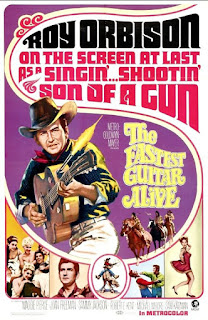The Fastest Guitar Alive (1967)
Roy Orbison was an artist that passed away too early. He died of a heart attack in 1989. 10 years prior he had largely given up the music business after failing to revive his career with the disco album Laminar Flow, an ill-fated idea from the beginning. Still, his unique voice and many of his older songs were still held in esteem, and his career received a needed boost when David Lynch used the song "In Dreams" in key scenes of Blue Velvet.
An album of re-recordings of his classic songs, a number of them produced by Lynch, followed quickly and sold decently. What really revived him was his involvement with Traveling Wilburys, a supergroup that also included Bob Dylan, Tom Petty, George Harrison and Jeff Lynne. Orbison contributed to vocals on almost all the tracks, and had his own solo song, "Not Alone Any More", included. This led to Lynne producing Roy Orbison's comeback album, Mystery Girl, which itself produced his first top-10 hit since the 1960s with "You Got It". Unfortunately, Orbison passed away right before the album's release.
Many of Orbison's songs were about heartbreak and tragedy, and he had plenty of it. 20 years before his career revival in the late 1980s he was facing a complete change of the musical landscape. Unique to many of the original rock and roll singers from the 1950s, he continued to be popular even after the Beatles arrived in the United States, but by 1967 music was changing so much that there was no way for him to keep up with current trends. His change of record labels also resulted in a change of his music, moving toward a more country sound, a path shared by many of his rock and roll contemporaries, and especially of his old labelmates at Sun Records. On top of that, he had managed to reconcile with and remarry his wife, only to have her die in a motorcycle accident while The Fastest Guitar Alive was in pre-production. He threw himself into preparing for, and writing music for, what would ultimately be his one attempt at breaking into a field he had always loved.
Orbison plays Johnny, a flamboyant womanizer who along with Steve (Sammy Jackson) and Flo and Sue Chestnut (Maggie Pierce, Joan Freeman) are a group of Confederate spies traveling to San Francisco under the guys of a medicine show. Their goal is to steal a delivery of gold meant for the San Francisco mint so they can get it back to the Confederacy, which is almost bankrupt and on the verge of losing the Civil War. Johnny just happens to have a unique contraption on him: a guitar which, when the right strings are plucked, reveals a rifle.
The heist goes off successfully, but not without raising the suspicions of Max (John Doucette), the local marshal, who soon puts two and two together and telegraphs ahead to Prescott to be on the lookout for the show. Meanwhile, the Civil War ends, leaving the band of spies with a bunch of gold and no destination for it, although a former associate Charlie (Lyle Bettger) and some corrupt local police officials have some ideas of what to do.
By some accounts this movie was supposed to be another vehicle for Elvis Presley, but he was wise enough to turn it down. It was also supposed to be a serious Western, but at some point got turned into a comedy. This was a bad idea because, even though it would never have been a great success - Roy Orbison wasn't much of an actor, and not even up to Elvis levels - it would have still been a much more enjoyable film. Instead, much of the humor ends up revolving around the repeated attempts of an Indian chief (Ben Lessy) to try to figure out the secret of "White Man medicine" after he sees Johnny's gun in action. Any time the tribe appears on screen it makes things rather difficult, as it drags out every Native American stereotype. I have a hard time thinking that even contemporary audiences would have found it that funny.
The other problem with making it a comedy is that the one thing that could have taken it into over-the-top b-movie territory and gave us a cult treat - Johnny and his guitar gun - is also used for comedic effect, particularly when the barrel emerges from the guitar. It is also made clear he can't hit anything with it, and of course no one gets hurt or dies. There are so many elements here begging to take what thin plot there is and just go all 1967 with it, but instead we get a stiff comedy with a singer whose career was already on the downswing.
The other actors are all competent, but there is really no other reason to watch this than to hear Orbison sing. Even with that these are some of his weakest songs, and there is always the soundtrack album if you really need to hear them.
The Fastest Guitar Alive was supposed to be the first of three movies in an attempt to transition Roy Orbison into being a movie star, but it was an utter failure and no further attempt was made to push him as an actor. By the time he had once again found an audience this movie was little more than a forgotten relic.
The Fastest Guitar Alive (1967)
Time: 87 minutes
Starring: Roy Orbison, Sammy Jackson, Maggie Pierce, Joan Freeman
Director: Michael D. Moore




Comments
Post a Comment